- Home
- Adam Thorpe
The Standing Pool Page 22
The Standing Pool Read online
Page 22
They bumped past the plaque with its gaudy offering and Alicia made gunshot sounds as best she could. Tammy’s sheep now made feeble, dying noises. Beans was asleep, head lolling like a drunk. It was still strangely misty today.
‘Nothing sourer than a sour Trot,’ Nick said, trying to make up for his burst of temper. ‘Except a bitter Leninist. As we used to say. And I should know. We’re the vanguard, comrades, not the guard’s van!’
‘That photo you had in your passport when I first met you,’ said Sarah, as the house swung into view through the trees, ‘it looked so like one of the Baader-Meinhofs. That hirsute one whose beard looked like a giant bow tie.’
‘They were all pretty hirsute.’
‘He was by far the hirsutest.’
‘What’s hirsoot, Daddy?’ asked Tammy, head thrust between the front seats.
‘Hairy.’
The girls exploded. The car growled to a stop.
‘Did mine really look like one, in the photo? A giant bow tie?’
Sarah nodded. ‘Uh-huh. Well, it was sort of on each side of your chin. A floppy bow tie. Thank God you’d grown up by the time I met you.’
Whiffs of pine sap, warm pine needles, sticky pine cones: always that flash feeling of bliss from pine sap, as if heaven or its equivalent was just round the corner. He had found a helpful, if rather heavy, field guide among the novels in the sitting room, concealed in plainness behind its lost dustjacket. A field guide to heaven would be thinner, he considered: he couldn’t quite think why. He was introducing the girls to the local flora and fauna in the part of the forest that was mostly pine.
He explained to them about what botanists call ‘litter fauna’ – the forgotten centipedes, slugs, worms, ants and so on who eat up what drops down onto the ground and then make fresh soil out of it.
‘Yuk,’ said Alicia. ‘Does it come out of their bottoms?’
‘Kind of,’ he admitted, turning a page of his crib.
Alicia shot to her feet and expressed disgust. From now on she’ll have a soil phobia, he thought. She’ll live her entire life in the city.
‘I was only joking,’ he fibbed. But it was probably too late. She’d end up in New York or Shanghai. ‘Let’s make a documentary about it.’
They scraped with twigs at the soft forest floor of pine-needles and instantly discovered creepy-crawlies, which Tammy filmed, using the zoom to make them bigger. Unfortunately, Beans enthusiastically stamped on a large, newly emergent snail and they spent several minutes trying to mend its shattered hull. Detergent-like spume began to ooze from its writhing, muscular slime.
‘That’s medicine to mend itself with,’ Nick lied. ‘Now it needs to be taken to the hospital and covered up.’
‘Antibotticks,’ Tammy nodded.
‘Anti bottoms,’ giggled Alicia.
‘Not quite,’ Nick said. ‘This is one-hundred-per-cent natural.’
He placed the broken, pulsating snail in his palm and carried it ceremoniously over to the next tree. The foam issued forth from its chilly bulk in surprising quantities, like the contents of a fire extinguisher. He hid its agony in the pine-litter under their innocent, enquiring gaze. Beans seemed not the slightest bit troubled. A moral lesson had been missed.
‘I used to put leaves and stuff on slugs, because I thought they were homeless,’ he told them. ‘That they’d lost their shells.’
‘When you were our age?’ checked Tammy.
He nodded. ‘A long, long time ago.’
A gunshot sounded, making them jump.
‘Whoops. It’s the Wild Hunt of Odin. We’ll have to whistle, kids. To let them know we’re here.’
‘Don’t like Odin,’ said Alicia, for whom Nick’s bedtime reading of the Norse myths was a luminous swirl of incomprehension.
‘Can’t whistle,’ Tammy admitted. ‘But I’m in training to.’
‘Sing then.’ Nick cleared his throat. He’d been told by the doctor to avoid singing for six months. But this was an emergency. ‘Frè-re Ja-cques, frè-re Ja-cques …’
Another gunshot, closer. It echoed dully and flatly through the tall pines. The song hiccupped and then continued, louder. They sang, raggedly, between the trees.
Sarah was at work in the bedroom while they were among the pines, using the little yellow table with the grapes painted on the drawers. She had reorganised and expanded a single paragraph from her thesis (which had been generally regarded as ‘exceptional’); it was so hard to fit everything in and yet keep order and sense.
The grand irrigation scheme of the Office du Niger in West Africa, its engineers inspired by the hydraulic works of British South India, was hardly consonant with contemporary conceptions of an ‘associationist’ rather than ‘assimilationist’ French empire (as illustrated by Normandin’s narratives of hydraulic decline and fall outlined in the previous chapter), and remained the exception. As Raymond Betts and Alice Conklin have argued, continued French rule would be assured by decentralised adaptation to the interests of native societies and economies on the part of modernising colonial developers. The Office du Niger’s vast waterworks were attacked by the Sorbonne geography professor Charles Robequain as being ‘a waste of time and money … [resulting] from an intense desire for assimilation, into which certain factions hoped to force not only people but climate and soil as well’ – unfavourably contrasting that scheme with the development plan he had drawn up for post-war Indochina.
She looked again at the paragraph and felt it needed major hydraulic works itself, perhaps preceded by a development plan. The laptop’s keyboard yielded again to her quick fingers – a spatter of rain on glass, a stormy gust of concentration. It was even worse: poor Normandin would have to be relegated to a footnote. She groaned hammishly in her throat. How odd, to make a private sound, to be completely alone.
On a strange whim, a kind of amusing feint, she opened a new document on the screen and began something entirely fresh:
Nobody is sure why Le Mas des Fosses is thus called, since there is no indication of any ‘quarry’ or ‘burial place’ in the records held at the two-room mairie in Aubain (the commune’s only village lying some five kilometres away by narrow road).
A local publication by the previous mayor of Aubain – a well-read ex-teacher and amateur archaeologist - suggests that, given its superb position, the site was a sacred place in the later Iron Age, marked by now-obliterated sacrificial pits or ditches before the ilex trees took over. His only evidence for this is a nineteenth-century discovery (recorded by the village priest but now lost) of an iron sword-blade folded back on itself, recovered during the laying of a terracotta water-pipe behind the house. The blade was dated to pre-Roman Gaul.
Scraps, she thought. We cannot always choose what we carry with us. A shopping list. A supermarket flyer. An iron sword.
Even if most of the above was lifted from her reading of the ‘local publication’, it was still good, objective history. Sarah did not yet know how to introduce her own memory into her account. She was too well trained, and history undoes memory, picking it apart and reducing it and reassembling it. No memory – organic, self-constructing – is ever reliable. It is easier to forget, or to reinvent. That is the role of the historian, she thought: to remember, and not worry about being despised for it. She was enjoying herself.
She turned over another page of the pamphlet and tapped gaily on, scarcely noticing the vague percussives of gunshots from the woods.
NINE
Jean-Luc has waited several days to carry the toy pram to his room, even though the van is parked almost directly in front of the house. If anyone were to see him, it might result in teasing that would ripple out until it got to Marcel’s ears, or one of his mates. Not a good idea. Not good at all.
Now he’s ready. He did supper in the microwave, took it up, pretended it had been hours in the making instead of five minutes flat, then got out to the café. He came back and was told in a whine that the phone had kept on ringing; she’d been bad all day
and couldn’t get down to it; if she’d tried she’d have fallen and bled to death while he was having fun in the café with his mates. Then she nagged at him about not having a phone upstairs. He told her the caller was bound to be Tante Juliette, which calmed her down.
‘You can throw the phone in the river, in that case,’ she snarled.
He sits in the kitchen until he is sure she’s asleep. She usually nods off before ten, then wakes up in the early hours, moaning. The handful of young lads left in Aubain do their evening bit on their mobilettes, setting his teeth on edge, up and down, up and down like wasps in his ears, before being tucked up in bed. He switches the telly off, slips out, opens the van, checks the coast is clear both ways along the street and that all the shutters are closed and then lifts the treasure, wrapped in a filthy, oil-stained blanket. It is easier than he expects, though his heart is hammering. The clattery bang of the van’s door reverberates up and down, but no one opens their shutters as he fastens the rope on its handle in one quick twist, not even nosy old Lucille two doors up. It’s the semi-finals of Star Academy, that’s why. He isn’t interested. Not now that sweet little Céline has been knocked out.
He lays newspaper on the kitchen table and gives the toy pram a wipe-down with hot water and paper towels under the bright neon strip. The metal struts and spokes are hardly dirty. Rust comes off on the paper, orange-brown. The rust has nibbled all the paint off. He could give it a new coat, in all the colours of the rainbow. Or just pink, like the handle. A glossy pink. At least three coats, after an application of that black, anti-rust stuff. A picture comes into his head of the English kids dancing around the pram, laughing at its bright pink shininess, happy as larks. But this isn’t for them. This is for him. Or no one at all. No one. Oncle Fernand, maybe.
Maybe it wasn’t ever a toy. Maybe babies were smaller, in the old days. He read that, somewhere. But not that small, surely.
He creaks up the stairs, tiptoes past his mother’s bed and makes it safely into his own room. The smell in hers is getting worse. He wonders if the nurse even bothers to change the commode each time she comes – twice a day, it should be. But Elodie is sometimes replaced by Colette, who is lazy and drinks. It makes him feel ill. He isn’t about to change it himself. He opens his window a little.
He clears his table and puts the treasure on it. Its four wheels fit easily inside the edge. The toy pram seems bigger, now. He moves it slightly, though it doesn’t move easily: rust has seen to that. Then, as he’s thinking hard, the phone rings downstairs in the kitchen. It is the old phone, so old it doesn’t even have a push-button dial and the mouthpiece sits on a cradle. Before the storm, they had two cordless phones and he ran one of them all the way up here. The storm did for them, as it did for the previous set. Now they’re back to the old one in the kitchen. They tried to sell him a mobile in the shop, but what would he want one of them for? People you don’t know ringing you all times of the day and night. Stupid messages. He read somewhere that there are 20,000 germs on each square centimetre of mobile. It made him feel sick.
Anyway, in Aubain mobiles only work on one spot outside the mairie, or in about half of the houses if you go upstairs –or into the attic, in some places. He’d like to be the last person left in the world without a mobile, sticking out to the end. Then the telly cameras would come round and he’d have to shout at them.
‘Go away! Piss off!’
Lots of reporters in the street. Fame at last. But he’d still shout at them to go away. And if they didn’t go away, he’d pick them off one by one with Papa’s hunting rifle and then there’d be floods of reporters, keeping a safe distance, until the specially trained police bods would come smashing in through the roof to fill his body with lead from their machine-guns while Maman called out next door, wondering what was up, desperate for her commode.
The phone stops. Hardly anyone phones them up, except for Tante Juliette. And she’s off her rocker.
He places the sieve carefully on the pram, where the baby-basket part would have gone. Bibi is in the sieve, legless in the spider’s web, next to the fish-bone; the little nail-heads on her naked skin are like warts. He has to find the spider, but it isn’t in his box under the bed. He knows that without looking. The fish-bone is a dead fly the spider has forgotten about. No, the fish-bone is the spider, the dead spider. It is Raoul the spider, dead. It is still after Bibi, though, being Raoul: it is a resurrected spider. I am the Life and the Resurrection. He doesn’t need a head for the spine, after all.
He pinches off some of the tiny bones until there are eight left, roughly. He places the eight-legged fish-bone on the edge of the sieve, just under the edge of the web. He doesn’t like the way it looks as if it’s about to gobble Bibi up. It will have to work its way slowly towards her. Give her a chance.
And growing up the handles of the pram will be the rosebush, full of faces. The Englishwoman’s face, all warm and smiling. He feels the excitement so strongly, this time, that his hands shake. Wire. A camera. Paint.
Under his fingernails is the earth of the Sandlers’ lawn. He planted a cherry tree today, the buds already swelling on its thin, twiggy branches. He dug a big hole next to the fenced lawn and watered it in with the hose until the earth was squelching underfoot. A bit late to plant a fruit tree, but at least he’s tried, carried out his orders. He should have put compost in, but he was behind with the stone wall up at the Swiss place, so he wasn’t about to go off looking for some. He should have bought some when he bought the tree at the nursery outside Valdaron, where the Sandlers have an account, but he was thinking about other things. More exciting things.
He picks at the black under his nails as best he can, given his excitement. Then he uses the point of his Opinel. He stares at the pram for a long time, hoping to share this moment, but Oncle Fernand is away.
Unless that’s him phoning, Jean-Luc chuckles to himself.
He lies on the bed and reads a Spirou through the squeaks and groans of the springs – his favourite, from 23 May 1957. Sonny, in Buck Danny, battling through the storm in the plane with the evil Japanese. He turns a page and it leaves the others, comes away from the rusty staples. He stares at it, stricken. He’s read it too much. Nothing goes on forever. He sees his father grinning in the kitchen over the pile in his arms, twenty-nine years ago.
‘I dropped him five francs,’ he said. ‘What do you reckon, Janno?’
Jean-Luc feels hungry. He tiptoes past his snoring mother and creeps downstairs and looks in the fridge, which has nothing much in it but some old vegetables lying in their juices and a Petit Suisse past its sell-by date. He’s been busy this week, thinking too much to shop. He eats the Petit Suisse and cleans the spoon with his mouth so that it shines and then catches his face looking up at him out of the spoon’s clear little mirror. He looks even uglier in the spoon, he thinks, like a fat clown; he moves the spoon slightly and his face, distorted by the curve, makes him laugh. And then he has an idea. It bursts into his head like a bird. No, like an angel.
He scuttles upstairs and pulls the box out from under the bed and scrabbles eagerly for the old green-tinged spoons. There are six! He found them in a broken cupboard thrown out onto a tip, years ago. Soup spoons, with shorter handles than modern spoons. He holds a couple of them next to the pram’s grip. All he needs to do is attach them. This is the best idea he’s ever had! It is how Oncle Fernand works: secretly, in silence. Six roses on the rose bush, Jean-Luc.
And the bowl of each spoon will bear a face, like Mary bore Jesus Christ.
Not that he believes in all that junk. And then the phone goes again. It almost scares him.
They found the lights didn’t work, on their return from the pine wood. There was a strange silence in the kitchen, which came from the fridge not operating. They went upstairs to find Mummy.
She was working in the bedroom. She didn’t even know the electricity had gone, just like that – her laptop had switched to battery mode and she’d not noticed the dip in the scree
n’s contrast. She hurriedly hid what she was writing by lowering the laptop’s screen, then snapped at Alicia for trying to peep.
They tried the fuse box immediately. Nothing. There were mice droppings on top of the box, like black husks of rice. They had three candles left. ‘This is how,’ Nick told the girls, ‘people used to live. Before electricity. No television. No light-bulbs. No radio. No computer. No fridges. They went to bed when it grew dark and got up at dawn. For thousands of years.’
‘Millions,’ Tammy corrected.
He reckoned it was the damp. Yesterday’s mist had blinded the house: it was warm and swirled about, it must have got in and shorted something. The wind would dry it all out. He went up to the bathroom and stood on the chair and tried to phone a few numbers in the phone book, but they were all finished for the day. He returned downstairs and Sarah suggested he phone Jean-Luc after making a big pot of tea, not realising the latter was impossible. Only then did they sense the gravity of the situation. They searched for more candles and unearthed a couple of stubs.
Bathroom locked, this time. Alicia. Beans and Tammy were downstairs, drawing houses – in Beans’s case, a manic jumble of marks they would all have to coo over. Tammy’s was King Solomon’s palace, plus a tennis court.
‘Are you going to be long?’ he called.
‘Go away.’
Tammy came up to observe.
‘Alicia, honey, I need to make an urgent phone call and there’s only one spot where the mobile picks up, and you’re in it.’
No answer. Alicia had been known to spend an hour in the bathroom. Preening herself, probably. At five years old! It was all a mystery to him.
‘Alicia, as you are aware we’ve got an emergency on our hands. No electricity. In fact, no telly,’ he added, in a fit of inspiration.
‘Telly’s bad for you. You said.’
‘OK, no lights. Night will fall and there’ll be pitch darkness everywhere. Creepy.’

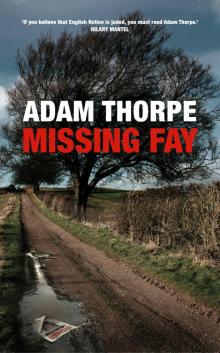 Missing Fay
Missing Fay Hodd
Hodd Pieces of Light
Pieces of Light The Standing Pool
The Standing Pool Ulverton
Ulverton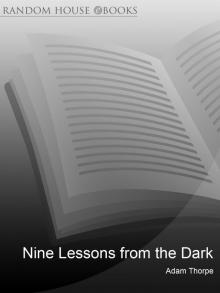 Nine Lessons From the Dark
Nine Lessons From the Dark Flight
Flight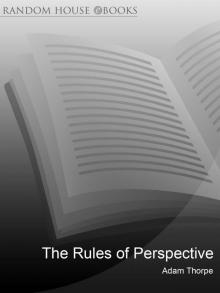 The Rules of Perspective
The Rules of Perspective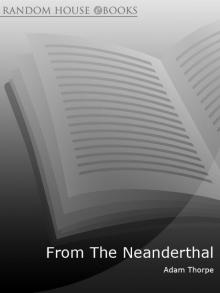 From the Neanderthal
From the Neanderthal Is This the Way You Said?
Is This the Way You Said?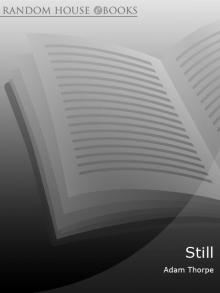 Still
Still No Telling
No Telling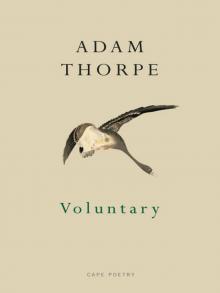 Voluntary
Voluntary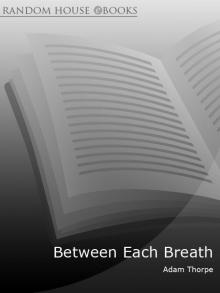 Between Each Breath
Between Each Breath